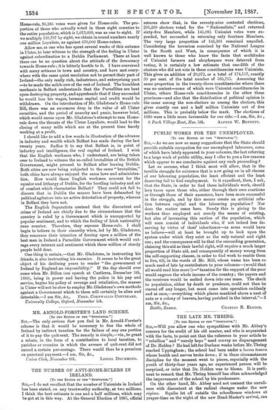PUBLIC WORKS FOR THE UNEMPLOYED.
rTo THE EDITOR. OP TES •• SPECTATOE."1 Ste.,—As we see now so many suggestions that the State should provide suitable occupation for our unemployed labourers, some of which have lately appeared in your columns, the last referring to a large work of public utility, may I offer to you a few reasons which appear to me conclusive against any such proceeding ?
Let us assume, what I think most will allow, that in the terrible struggle for existence that is naw going on in all classes of our labouring population, the least efficient and the leash deserving fail to find employment. Is it expedient, then, I ask, that the State, in order to find these individuals work, should levy taxes upon those who, either through their own exertions or through those of their ancestors, have been more successful in the struggle, and by this means create an artificial rela- tion between capital and the labouring population ? Nor does the matter cease here. Surely this is giving to the workers thus employed not merely the means of existing, but also of increasing this section of the population, which will soon consist of individuals who, if not indeed less de- serving by virtue of their' inheritance—as some would have. us believe—will at least be brought up to look upon the system under which they exist as the only natural and right one ; and the consequence will be that the succeeding generation, claiming this aid as their lawful right, will require a much larger proportion of State aid, and consequently of money wrung from the self-supporting classes, in order to find work to enable them to live, till, in the words of Mr. Mill, whose name has been so. much used of late by contributors to your columns—(would that all would read him more!)—" taxation for the support of the poor would engross the whole income of the country ; the payers and the receivers would be melted down into one mass. The check to population, either by death or prudence, could not then be staved off any longer, but must come into operation suddenly and at once,—everything which places mankind above a nest of ants or a colony of beavers, having perished in the interval."—I am, Sir, &c.,
































 Previous page
Previous page